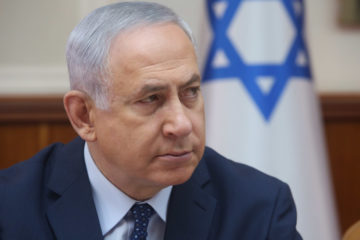Netanyahu Using Tougher Tactics to Crush New Palestinian Assault

©2015 Bloomberg News
NVWYTOSYF01X
(Bloomberg) — Mowiah Abu Jamal watched an Israeli army wrecking crew tear down his family’s east Jerusalem home this week, almost a year after his brother and cousin entered a synagogue across town and wielded axes and guns to kill a group of rabbis at prayer.
While the Palestinian assailants were slain on the spot by police, Prime Minister Benjamin Netanyahu ordered their homes destroyed, believing that punishing family members deters future attacks. After months of court challenges, Netanyahu pushed the demolition through this week, vowing to raze more homes as part of a series of steps to snuff out a fresh wave of violence, the most serious in years.
On Thursday, at least eight Israelis were stabbed and two Palestinians were killed in a clash with Israeli police. There was little sign that the surge was slowing down, a serious challenge to Netanyahu, who canceled a trip to Germany to oversee a response to the crisis.
There have been two Palestinian uprisings, or intifadas, against Israeli occupation since the late 1980s. The spike in stabbings, stonings and shootings of recent weeks has Israelis and Palestinians wondering if they are witnessing the start of a third and, if so, why now.
New Generation
Seeking an explanation, some observers point to the recent speech by Palestinian President Mahmoud Abbas at the United Nations asserting that the 22-year-old Oslo peace accords deserve an unceremonious burial. Others note that the West Bank youngsters attacking Israelis with rocks, knives and guns are a new generation with little memory of what the last one suffered in the uprising of the early 2000s. Finally, many blame growing frustration over crumbling economic conditions.
“It’s a ticking bomb,” said Jehad Harb, a Palestinian political scientist in Ramallah. Saeb Erekat, the Palestine Liberation Organization’s new secretary-general, said the house demolitions and other get-tough steps are collective punishment barred by international law.
In theory, both Abbas and Netanyahu remain committed to a two-state solution and, so far, coordination between Israeli and Palestinian security services is keeping a leash on militant groups throughout the West Bank. Israel’s penetration into Palestinian street gangs was vividly demonstrated this week when Agence France-Presse posted video of a confrontation between rock-hurling youngsters and Israeli military forces. Suddenly three of the stone-throwers tore off face scarves and pulled out pistols, revealing themselves as Israeli agents and arresting several of the Palestinians.
The situation is so volatile right now that “you only need one accident and all hell could break loose,” said former Israeli negotiator Gilead Sher, a senior fellow at the Institute for National Security Studies in Tel Aviv. Young Palestinians “are fed up with the repeated futile rounds of negotiations. They understand that Israel can’t be beaten militarily but they think that taking to the streets might change the rules of the game.”
At a press conference late Thursday, Netanyahu blamed Abbas for inciting the violence. “We are in the midst of a cruel wave of terror,” he said, promising “aggressive steps” to restore quiet. He said members of parliament would be barred from entering the Temple Mount area in Jerusalem’s Old City, which Muslims call the Noble Sanctuary, in order to reduce the chances of violence. A visit to the site by former Prime Minister Ariel Sharon in 2000 has been blamed for touching off the second intifada.
Majority for Armed Conflict
Surveys point to a new level of Palestinian anger. Fifty- seven percent of Palestinians favor returning to armed conflict against Israel, according to one poll published Oct. 6, up from 49 percent three months ago. The Ramallah-based Palestinian Center for Policy and Survey Research also found that Abbas would lose to Hamas leader Ismail Haniyeh if presidential elections were held. The poll of 1,200 Palestinians in the West Bank and Gaza Strip had a margin of error of 3 percentage points.
Netanyahu announced his strategy for quelling Palestinian unrest after the weekly cabinet meeting Oct. 4. The steps include acceleration of home demolitions, widening the use of imprisonment without trial and deploying more security forces in the West Bank and east Jerusalem. Two weeks earlier, he proposed a minimum prison sentence of four years for rock-throwers and easing open-fire orders for soldiers and police.
Palestinian attacks have increased since mid-September amid clashes at the Jerusalem site holy to both Jews and Muslims. Both Abbas and religious leaders have accused Israel of desecrating the Al-Aqsa mosque, Islam’s third-holiest place, when soldiers clashed with Palestinians throwing rocks and shooting fireworks from the shrine.
The mosque sits in Jerusalem’s Old City above the Western Wall, Judaism’s most revered site. It is in east Jerusalem, which was captured by Israel in the 1967 Middle East war and later annexed in a move that was never internationally recognized. Palestinians seek east Jerusalem as the capital for their future state. Israelis say the unified city is rightfully theirs, the heart of their national and religious history.
Spiking Violence
Four Israelis and seven Palestinians have been killed in the last week. Since the uprising of more than a decade ago, Israeli commando units have maintained a close watch over the West Bank, arresting suspects and removing arms caches at night. Palestinian security forces have played a key role in preventing violence as well. Whether the Israeli security forces have sufficient control, and where the Palestinian troops apply their force, could determine whether another uprising occurs.
Surveying the destruction of his family’s house stemming from last year’s synagogue massacre, 42-year-old Abu Jamal said the demolitions and other punishments will only increase the resolve for battle with Israel. “Any reaction by Israel will be met by our reaction,” he said.
To contact the reporter on this story: Jonathan Ferziger in Tel Aviv at jferziger@bloomberg.net To contact the editors responsible for this story: Alaa Shahine at asalha@bloomberg.net Ethan Bronner, Bob Ivry






No Comment